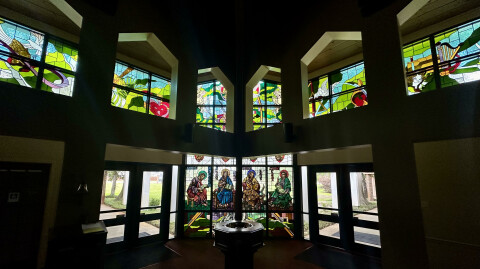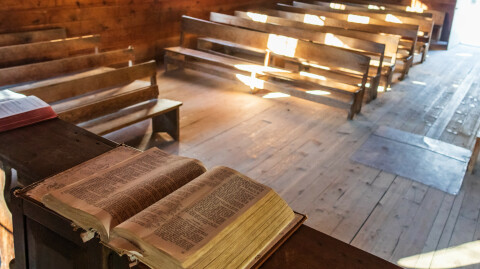TLDR: I have been asked to share my notes for the Ash Wednesday sermon on 2-22-23 at 7:00 pm. Please see below and feel free to contact me if you have any questions.
I find it very interesting that the Season of Lent begins with the following statement, “Jesus said, ‘Beware of practicing your piety before others in order to be seen by them; for then you have no reward from your Father in heaven.’” Yet, we are here today to practice a very public ritual. It doesn’t get much more public than to walk around town with ashes on our foreheads. When people see these ashes, they will know that we went to church, which means they will be seeing our piety. I wonder how Jesus of Nazareth practiced Ash Wednesday?
Thank you for laughing. Sadly, no one during the time of Jesus celebrated Ash Wednesday. This practice was unknown at the time. We do know, however, that as early as the Second century, some Christian communities began to celebrate the crucifixion of Jesus on the same day as the Jewish Passover, which meant that Easter was celebrated two days later, regardless of the day of the week. The Council of Nicaea in 325, set the day for Easter as the first Sunday, following the first full moon, after the Spring Equinox, which means any Sunday from March 22 to April 25. (Encyclopedia Britannica.) Soon after this, churches began to prepare for Easter by fasting for a period of time, usually six full weeks or forty-two days. Since Sundays were excluded from fasting, this left thirty-six days for the penance. In the 7th century, four days were added to Lent, making it forty full days (excluding Sundays,) so that the season would resemble the forty days and forty nights Jesus fasted and was tempted in the desert.
It was the practice in Rome that notorious sinners, who had broken communion with the Church during the year, would be sprinkled with ashes on their heads and forced to wear sackcloth as a sign of their repentance. This public show of sorrow took place at the liturgy that started the season. These sinners were separated from the rest of the congregation in a different section of the church, but after forty days of penance, they were reunited to the Church on Maundy Thursday. By the tenth century, the practice of covering the head with ashes was no longer in practice, so the Church began to apply a sign of the cross with ashes on the congregation as a memory of our mortality. This “Memento Mori” or remembrance of our death was accompanied by the formula, “Remember that you are dust and to dust you shall return.” (Ibid.)
By reminding us of our death, Lent invites us to a process of dressing down. As we go through life, we put on extra weight that slows down our walk of faith and our relationship with the Lord. Some of these layers provide us protection, but they slow us down nonetheless. Let me give you a few examples of this: We get hurt by someone we love, and from that moment on, we make the decision not to trust anyone again. This decision will protect us from experiencing pain, but it also will cause us to become isolated from others and perhaps even from God. In some cases, a person of a different race or ethnic background offends us or fails to live up to our expectations, and from then on, we purposely act cautiously with other members of that ethnic or racial group, or bad-mouth all because of the sins of one. Perhaps this decision will insulate us from being taken advantage of, or offended by someone, but eventually this protective layer develops into hatred, racism, fear, and intolerance. Others may have been financially exploited by a bank or other lender and now they decide to strike first, exploiting others for gain before they feel exploited themselves. This decision could protect them from abuse, but it also becomes unfair treatment of other people.
Psychologists call this building of defenses, the process of armoring up, or covering with armor. Armor is a protective mechanism that creates physical and emotional distance between us and others. The more armored we are, the more defensive we will be. Our interactions with others become shallow, we avoid intimacy and vulnerability, and we become easily resentful when others don’t meet our unrealistic expectations. Needless to say, these behaviors will lead to progressive loneliness and bitterness. They also can lead to a variety of sins.
Sin can protect our ego, but it also builds a wedge between us and God, and eventually it has the potential to make us much less than what God intended us to be. Our lives become entangled by resentment and hatred, by a misguided view of what’s important, by a utilitarian treatment of others, and by a constant move away from God and others. These layers can be protective at first, but eventually this extra weight becomes much too heavy a burden for us to carry. The time comes when we are so overwhelmed with the extra guilt, anxiety, resentment, isolation, and bitterness that we can barely tolerate the company of others, and feel abandoned by God.
Lent invites us to pair down, to ask God for forgiveness, to place all of our burdens at the feet of the cross of Jesus, and to get rid of armor that no longer protect us, but rather enslave us and limit our movements. But Lent also reminds us that we are not alone in this journey of self-assessment and in this task of getting rid of these extra layers. God’s Holy Spirit accompanies us in our desert experience, as it accompanied Jesus during his forty days of fasting and testing. In fact, without the Holy Spirit none of us would have the ability to change anything in our lives.
The prophet Joel reminds us that, “Yet even now, says the LORD, return to me with all your heart, with fasting, with weeping, and with mourning; rend your hearts and not your clothing. Return to the LORD, your God, for he is gracious and merciful, slow to anger, and abounding in steadfast love, and relents from punishing.” (2:1-2,12-17.) God knows the heavy burdens that weight us down, and he longs to lift them from our shoulders and from our hearts. Our God accepts U-turns, and Lent provides us the opportunity to assess the direction of our life and to begin the process of turning around and heading in the direction God desires for us.
Ashes remind us that we are made out of dust and to dust we will return. Life is too short to be isolated from God and from each other. May this Lent help you to assess your life, to choose to shed what’s unnecessary from it, and to prepare yourself in mind and spirit to celebrate the great mysteries of our salvation during Holy Week. To love is to seek reconciliation and forgiveness. May the Lord help you accomplish this in all your relationships.
Blessings,
Fr. Roman+





